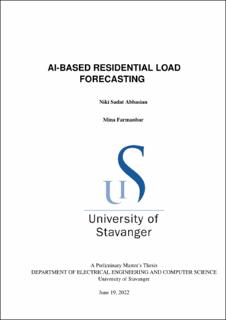| dc.description.abstract | The increasing levels of energy consumption worldwide is raising issues with respect to
surpassing supply limits, causing severe effects on the environment, and the exhaustion of energy resources. Buildings are one of the most relevant sectors in terms of energy consumption
in the world. Many researches have been carried out in the recent years with primary concentration on efficient Home or Building Management Systems. In addition, by increasing
renewable energy penetration, modern power grids demand more accurate consumption predictions to provide the optimized power supply which is stochastic in nature. This study will
present an analytic comparison of day-ahead load forecasting during a period of two years by
applying AI based data driven models. The unit of analysis in this thesis project is based on
households smart meter data in England. The collected and collated data for this study includes historical electricity consumption of 75 houses over two years of 2012 to 2014 city of
London. Predictive models divided in two main forecasting groups of deterministic and probabilistic forecasting. In deterministic step, Random Forest Regression and MLP Regression
employed to make a forecasting models. In the probabilistic phase,DeepAR, FFNN and Gaussian Process Estimator were employed to predict days ahead load forecasting. The models are
trained based on subset of various groups of customers with registered diversified load volatility level. Daily weather data are also added as new feature in this study into subset to check
model sensitivity to external factors and validate the performance of the model. The results
of implemented models are evaluated by well-known error metrics as RMSE,MAE, MSE and
CRPS separately for each phase of this study. The findings of this master thesis study shows
that the Deep Learning methods of FNN, DeepAR and MLP compared to other utilized methods like Random Forest and Gaussian provide better data prediction reslts in terms of less
deviance to real load trend, lower forecasting error and computation time. Considering probabilistic forecasting methods it is observed that DeepAR can provide better results than FFNN
and Gaussian Process model. Although the computation time of FFNN was lower than others | |
